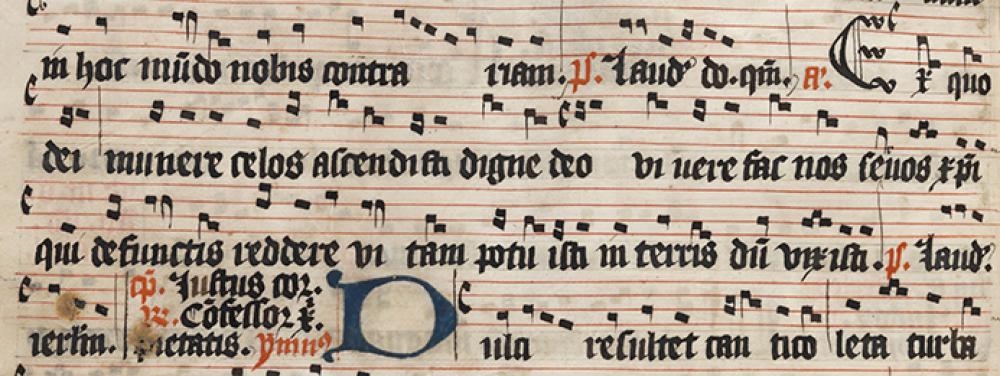Dulci resultet cantico
| TYPE | 3 - Complex Melody |
| TOPIC | Religious |
| TUNE STRUCTURE | abba |
| VERSE STRUCTURE | 5v 4l |
| KEY SIGNATURE | Mode 7 |
| TONAL CENTRE | G |
| INCIPIT | GAGFGAGABC'BA |
| GENRE | Hymn |
| TEXT SOURCE | Clondalkin Breviary: Office of St Canice TCD MS 78, f. 168v |
| TUNE SOURCE | as above |
| FIRST LINE | Dulci resultet cantico |
| NOTATED INCIPIT | |
| The Clondalkin Breviary consists of chants for the Divine Office which date from the second half of the fifteenth century. Senan Furlong notes that, ‘[a]though it was also used at Clondalkin near Dublin, its original provenance may be the Ossory / Kilkenny area. […] Its calendar contains entries for 27 Irish saints in the original hand. In the sanctorale, which contains material for the celebration of the feastdays of saints, there are notated offices for Sts Brigid, Patrick, and Canice, all of them incomplete owing to the loss of the original folios’. See Senan Furlong, ‘The Clondalkin Breviary’, The Encyclopaedia of Music in Ireland, eds. Harry White and Barra Boydell, 2 vols. (Dublin, 2013), I, p.209. | |
1.Dulci resultet canticoleta turba fideliumsancto decantans Cannicotota virtute cordium.2.Qui natus in Kenaciaclaram traxit origineattingens Dei graciavirtutum celsitudine3.Hic ab adolescenciaiugum portavit Dominidivina providenciasancto se donans ordini.4.Mundum calcat sub pedibussuspirans ad celestiamultis clarus virtutibusletus gaudet in patria.5.In Trinitate simplicisoli Deo sit Gloriaqui prece sancti Cannicinos ducat ad celestia.
With sweet singing letthe joyful crowd of the faithful resoundchanting to St Canicewith the whole capacity of their hearts.He who was born in Keenaghtdrew good repute from his originsby the grace of God reachingto the height of virtue.This man from his youthcarried the yoke of the Lordby divine providencegiving himself to Holy Orders.He treads the world beneath his feetyearning for heavenly things,famous for many virtuesjoyful he exults in his homeland.In the undivided Trinitylet glory be to God alonewho through the prayer of Saint Canicemay lead us to heavenly things.


